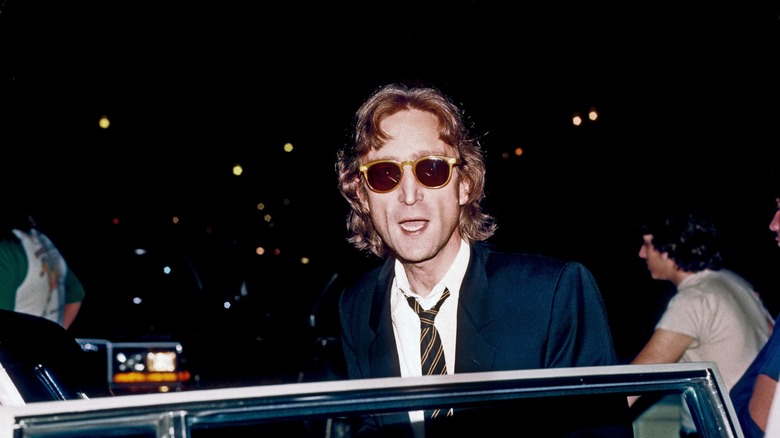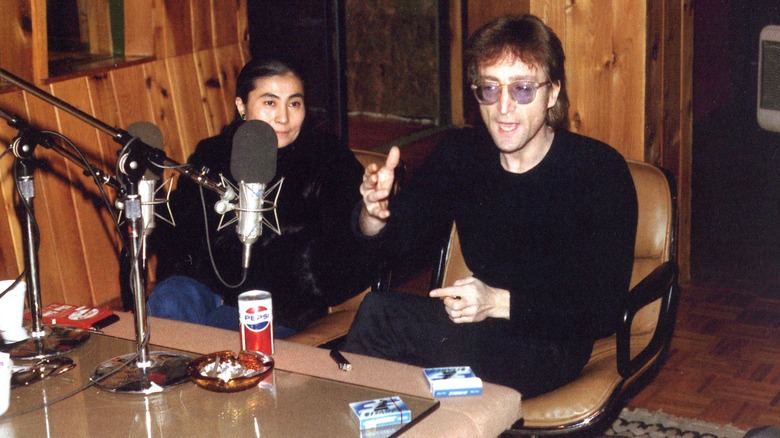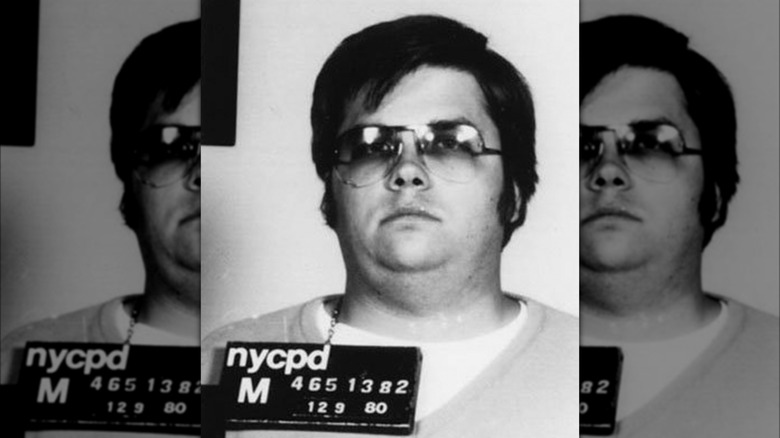Real-Life Accounts From The People Who Witnessed John Lennon's Murder
"Yes," John Lennon replied to the police officer's question, "Are you John Lennon?" It was the last thing he said before dying on December 8, 1980. As Far Out Magazine recounts, Mark David Chapman stood nearby under custody at the Dakota apartment building in New York City, where he'd shot Lennon mere minutes prior. The legendary Beatles musician was making his way back home from a recording session with his wife, Yoko Ono, when four bullets struck him and a fifth missed. Less than six hours earlier Chapman had asked Lennon to sign a copy of 1980's "Double Fantasy," released that November by Lennon and Ono. In 2022 NPR says that Chapman was denied parole for the 12th time, at 67 years old.
Many of these facts are familiar to Beatles fans and non-fans alike. But even after 40 years not every fact about the night of Lennon's death is known. For instance: Who were the police officers on duty? Was there anyone on the street nearby? What about medical staff? As it turns out, The Telegraph reports that there was indeed an attendant inside the Dakota building, a taxi driver outside, and first responders who treated Lennon. "John Lennon: Murder Without a Trial" director Nick Holt says that he wanted to interview these people before they die and the opportunity is lost forever. Some witnesses are emerging from their lives to speak up for the first time about what they saw and did the night Lennon died.
Eyewitnesses to the death and its aftermath
While we don't know precisely what each and every witness to John Lennon's murder has been up to for over 40 years, the AppleTV docuseries "John Lennon: Murder Without a Trial" by all accounts does a thorough job of collecting everything they saw and did on December 8, 1981.
The most striking account might come from taxi driver Richard Peterson, who was sitting outside in his cab when he watched Mark David Chapman shoot Lennon. "Lennon was walking in," The Telegraph quotes him, "and this kid says, 'John Lennon.' He was a chunky guy. I'm looking at him through the front window of my cab. I'm looking at him shoot him. This guy just shot John Lennon. I thought they were making a movie, but I didn't see no lights or cameras or anything so I realized, hey, this ain't no movie."
Meanwhile, The Telegraph says that Dakota building concierge Jay Hastings saw events unfold from the other side, as Lennon ran by and said, "I'm shot." Hastings continued, "He had blood coming out of his mouth. He just collapsed on the floor. I half rolled him to his back and took his glasses off, put them on the desk. And Yoko was screaming, 'Get an ambulance, get an ambulance, get an ambulance.'"
NYPD Officer Herb Frauenberger, meanwhile, had no idea that it was John Lennon who'd been shot. He turned his shooting victim's head to the side to look for a pulse and said, "Holy smokes, this is John Lennon" (via The Telegraph.)
A death that shocked the world
The medical staff at Roosevelt Hospital provide an additional perspective on the night Lennon died. Much like NYPD Officer Herb Frauenberger, The Telegraph says that Dr. David Halleran was overwhelmed by treating none other than John Lennon. He and his team worked to save Lennon's life for almost 45 minutes "before it became futile and we called it and stopped." Sometime later Nurse Barbara Kammerer broke the news to Yoko Ono while Lennon's iconic song "Imagine" played from the hospital speakers in Muzak form. Ultimate Classic Rock describes musicians like Stevie Wonder who broke the news onstage to their respective crowds.
As for Mark David Chapman — who also saw everything unfold firsthand — it seems like he never intended to not be caught. USA Today quotes him openly owning up to his actions, saying, "I am not going to blame anything else or anybody else for bringing me there. I knew what I was doing, and I knew it was evil. I knew it was wrong, but I wanted the fame so much that I was willing to give everything and take a human life." As for why he shot Lennon in the first place, Chapman cited hypocrisy, saying in The Telegraph, "All You Need Is Love, have you ever heard that? Well, this is what I say to that: all you need is love and $250 million dollars. He [Lennon] was the biggest, phoniest bastard that ever lived."


